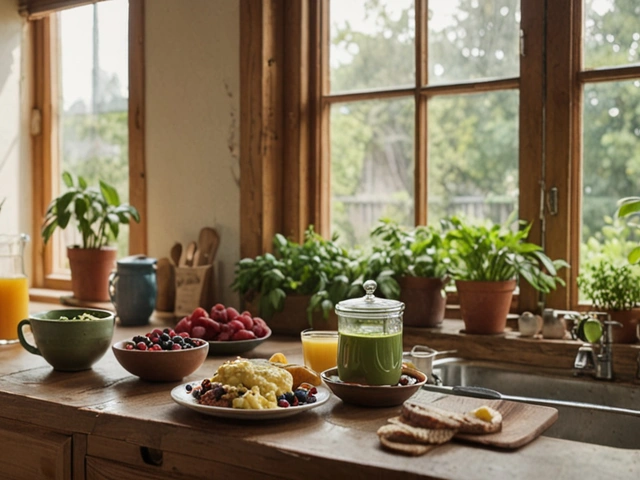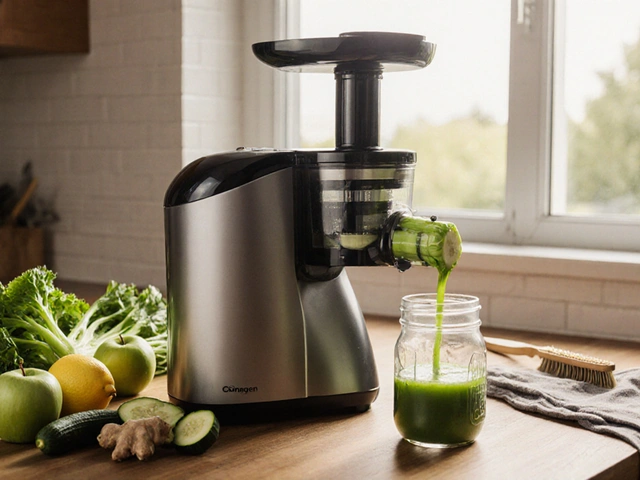Have you ever felt like your stomach is holding a grudge against you? You're not alone. Our gut health can sometimes seem mysterious, but it doesn't have to be. The coolest part? Tiny lifestyle tweaks can make a huge difference.
One of the best things you can do is eat more fiber. Think fruits, veggies, whole grains—foods that make your gut happy. Fiber helps keep things moving smoothly in your digestive system. And guess what? It can actually make you feel fuller, longer.
Don't underestimate the power of water, either. Staying hydrated is like giving your digestive system a hug. Water helps break down food and allows your body to absorb nutrients properly. So, next time you're feeling a bit off, try reaching for a glass of water instead of something sugary.
These small changes aren't just about feeling better in the short term. They're about setting your gut up for success in the long run. Stay with us as we dive deeper into how these tweaks can work wonders for your inner ecosystem.
Understanding Your Gut
Your gut is more than just a digestion machine; it's practically a second brain. You’ve probably heard folks talking about “gut health” a lot these days, and for good reason. The gut is home to trillions of microbes known as the gut microbiome, which is important for not just digestion, but also for your overall health.
What is the Gut Microbiome?
The gut microbiome consists of a complex community of bacteria, viruses, and fungi living in your intestines. These tiny organisms help digest food, regulate the immune system, and even maintain mental health. Crazy, right? Some scientists even believe that an imbalance in these microbes could lead to issues like irritable bowel syndrome or even mood disorders.
Why Gut Health Matters
Your gut is deeply interconnected with systems in your body. Have you ever felt butterflies from nervousness? That's your gut-brain connection in action. A healthy gut could mean fewer digestive problems, better mood, and even clearer skin. According to some recent studies, people with healthy guts tend to catch fewer colds, too.
Getting to Know Your Gut
Curious about how your gut measures up? Sometimes it's useful to track how you feel after eating certain foods. Keep an eye on whether you experience bloating, discomfort, or other unpleasant symptoms. By noticing patterns, you can start to identify what works for you and what doesn't.
You need a little spark of curiosity to get to know your gut’s needs. As you start this adventure, you'll notice specific foods and habits that trigger unpleasant symptoms. You'll soon appreciate the communication between your brain and your gut—probably more than you thought was possible!
Healthy Eating Habits
If you're really looking to boost your gut health, changing up what you eat can have a big impact. Let's start with something simple: eat more plants. Fruits, vegetables, and whole grains are packed with fiber, which is super important for keeping your digestive system in top shape. Fiber helps your gut microbiome, those tiny bacteria in your stomach, thrive.
Variety is the spice of life, right? It turns out, it's also key for your gut. Eating a wide range of plant-based foods has been linked to a more diverse gut microbiome. Aim to get different colors on your plate – each color represents different nutrients. Not only does this make meals more exciting, but it also supports your digestion.
Add Fermented Foods
Fermented foods like yogurt, kimchi, sauerkraut, and kefir are great sources of probiotics. These are the good bacteria that help your gut stay healthy. They can improve digestion and boost the immune system. So, it makes sense to make them a regular part of your diet.
Beware of Sugars and Fats
That morning donut might be tempting, but too much sugar and unhealthy fats can mess with your gut health. High sugar diets can lead to an imbalance in the microbiome, with less of the good stuff and more of the bad microbes. Try to limit processed foods and instead go for healthier alternatives.
Listen to Your Body
Your body is smarter than you might think. Pay attention to how different foods make you feel. Everyone's gut is unique, so finding the right balance might take a bit of trial and error. If dairy leaves you bloated, maybe your body prefers lactose-free options. Keep experimenting until you find what works best for you.
Meal Timing and Moderation
Eating smaller meals more frequently might ease your digestion. Also, try not to eat too late at night. Giving your body time to digest before bed helps your digestive system work better overall.
Healthy eating habits aren't just about what you eat, but also how you eat. Take your time to enjoy meals, chew thoroughly, and you'll find it's a whole different experience in how it affects your gut.

Importance of Hydration
Keeping your body well-hydrated is super important for maintaining good gut health. Let's face it, without enough water, your digestion can slow down, leading to all sorts of uncomfortable issues.
Water acts like a transport system for waste through your intestines. Think of it as the oil that ensures everything in your digestive tract runs smoothly. By drinking enough water, you're helping prevent constipation, which can throw your gut's balance all out of whack.
"Staying hydrated is key to promoting healthy digestion and nutrient absorption," says Dr. Jane Michaels, a gastroenterologist at Vancouver General Hospital.
How Much Water Should You Drink?
The ideal amount of water a person should drink each day can vary, but a commonly recommended amount is about 8-10 cups for adults. Your needs might be different, based on your body size or activity level, but it’s a good starting point.
Tips to Stay Hydrated
- Start your day with water: Try drinking a glass before you do anything else!
- Flavour it: If plain water isn't your thing, try adding slices of lemon or cucumber to jazz it up.
- Carry a bottle: Have water handy to sip throughout the day.
- Eat water-rich foods: Munch on watermelon, cucumbers, or celery.
If you're unsure whether you're getting enough water, your urine is a solid indicator. Aim for a light yellow color. Remember, your body's optimal hydration doesn't only help with digestion but also boosts energy and keeps skin clear.
Staying hydrated is a simple, effective way to support your gut health. So, why not make carrying a water bottle as essential as your phone?
The Role of Movement
Did you know that just moving around can have a big impact on your gut health? It's true! Regular physical activity can do wonders for your digestion. Let's break it down. When you exercise, it stimulates the muscles in your gut, helping food move through your digestive system more efficiently. This can help prevent symptoms like bloating and constipation.
One fun way to incorporate movement is through walking. Aim for at least 30 minutes a day. It doesn't even have to be all at once! A brisk walk after meals can really kickstart your digestion.
Types of Exercises that Aid Digestion
While all exercise is generally good, some are particularly great for enhancing digestion:
- Yoga: Certain poses, like twists, have been shown to massage and stimulate the digestive organs.
- Cycling: This moderate-intensity exercise can get your blood flowing and engage your core muscles, which can help with digestion.
- Jogging: Light jogging also helps keep your system moving and can improve overall gastro health.
Exercise and Gut Microbiome
Interestingly, exercise can also influence your gut microbiome—the collection of trillions of bacteria living in your digestive tract. Studies show that regular activity can increase the diversity of your gut flora, which is a marker of good health.
Don’t stress about being a gym rat. Find something you like and stick with it. It's about having a routine that keeps you moving, making both your body and belly happy. Plus, that's one habit that goes far beyond benefits to just digestion—it's a win for your overall health, too.






